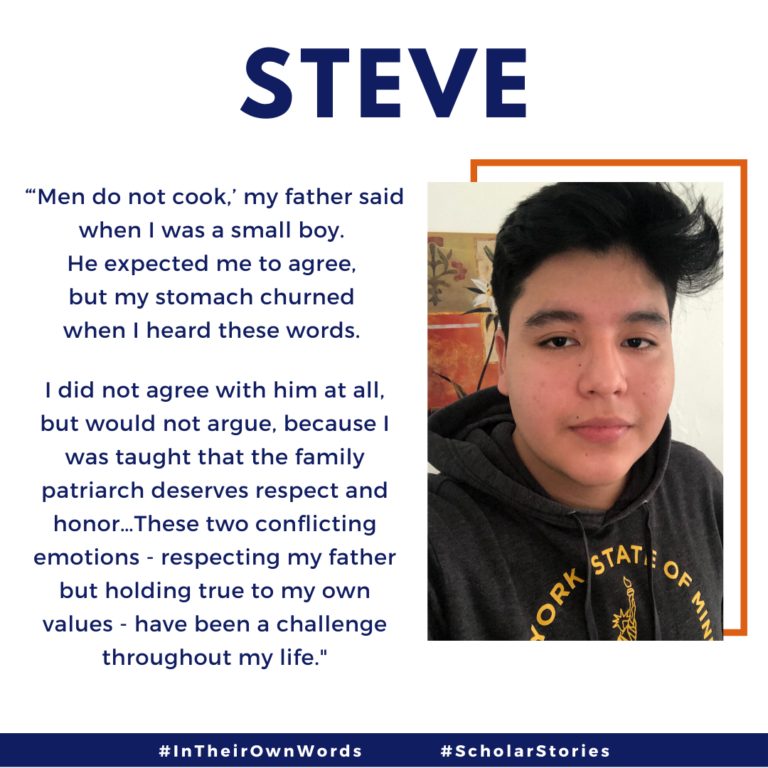LUCA is proud to launch its #InTheirOwnWords series! Over the next few weeks, we will share personal statement essays written by the Latino U Scholars Class of 2021 so that our Scholars can introduce themselves – and share their experiences during these unprecedented times – in their own words. All essays are shared with the permission of each Scholar. The essay below was written by Steve, a Latino U Scholar from Ossining High School.

STEVE’S PERSONAL STATEMENT
“Men do not cook,” my father said when I was a small boy. He expected me to agree, but my stomach churned when I heard these words. I did not agree with him at all, but would not argue, because I was taught that the family patriarch deserves respect and honor. In Latino culture, the head of the household is the final authority on all decisions. These two conflicting emotions – respecting my father but holding true to my own values – have been a challenge throughout my life.
My father’s beliefs are rooted in rigid, traditional, gender roles going back generations; passed from father to son, man to man. Women are inferior. It is wrong for men to engage in feminine activities such as cooking and cleaning. A man is weak if he cries. This sexist culture that I was brought up in teaches men that women’s tasks deflate and strip them of their masculinity. Every molecule in me wanted to escape this way of thinking; I wanted to flee from a legacy that my father and his father before him held sacred. One day, I will be on my own and will forge a relationship with a woman that is based on respect and equality. Although my parents gave me the wings to fly, I felt stuck and uncertain about how to use the wings to forge my own identity.
I wanted to live without being told how to “be a man,” but at the same time, I hated that my values were completely opposed to his. Latino children are taught that their parents are the wisest people; that they are always right because they love us and want the best for us, and so we must honor and respect their rules. However, parents are not always correct, and it is okay to go against them because they are ordinary people who make mistakes. As I watched my mother ask her husband’s permission to shop or go out with a friend, I could see her sadness, her commitment to obey him without complaint. I saw that the opportunities she had to be her own person had been constrained her entire life. I knew this was wrong, and I realized I had to take a stand.
I had shouted my feelings at my father many times with no result, and this hurt both of us. We ceased to communicate and grew further apart. One day, as I remembered my grandfather wisely saying, “he who perseveres reaches,” I decided to try once again to explain myself and suggested we disclose our feelings to each other. At my turn, I told him that the culture of machismo in our home prevents us from being healthy, free, and independent individuals. I suggested changing roles so he could see how my mother and my sister suffer under his domination. Slowly, but finally, he understood he had to adapt, to accept that his son is not going to be exactly like he is; that he should be more open-minded with his wife and daughter and more involved in our family. For the first time in his life, my father cooked! It was not the best dish, but he did it! He made mac and cheese, a little salty and raw, but the intention and the effort were what counted. My father has examined his life and made changes that are reflected not only in words but in actions. We breathe more freely with new privileges and understanding, and although it is not perfect, we work on it every day.
“Please pass me the pepper, this needs more flavor,” my father recently said, as I helped him prepare dinner. These words, emitted from his mouth, I could hardly conceptualize – the behavior of a modern man – one I could look up to and emulate, proudly, as I pursue my own path unapologetically.
